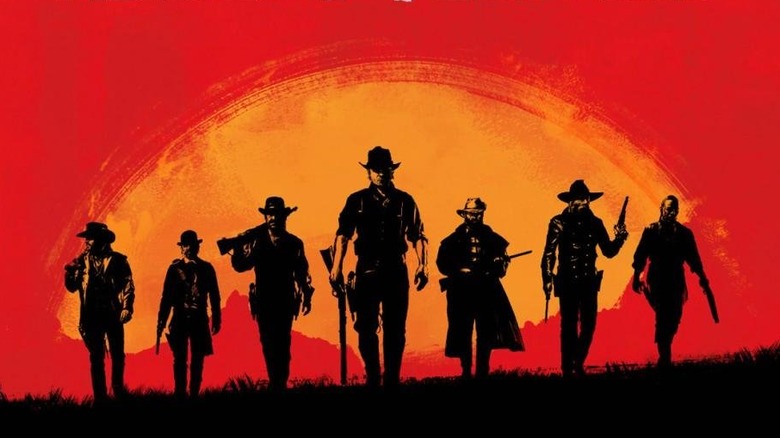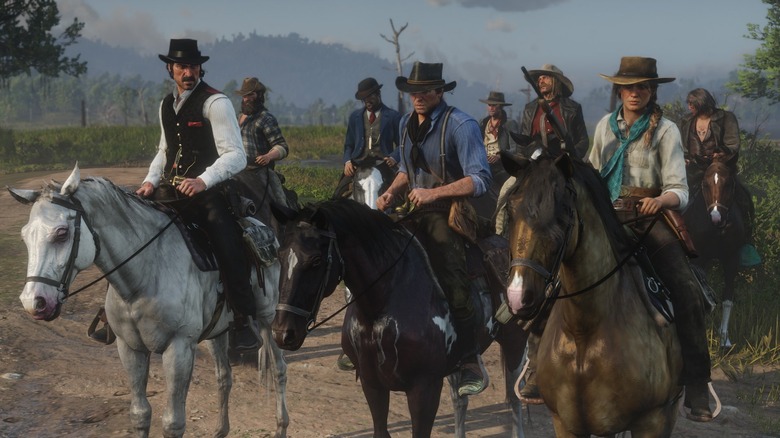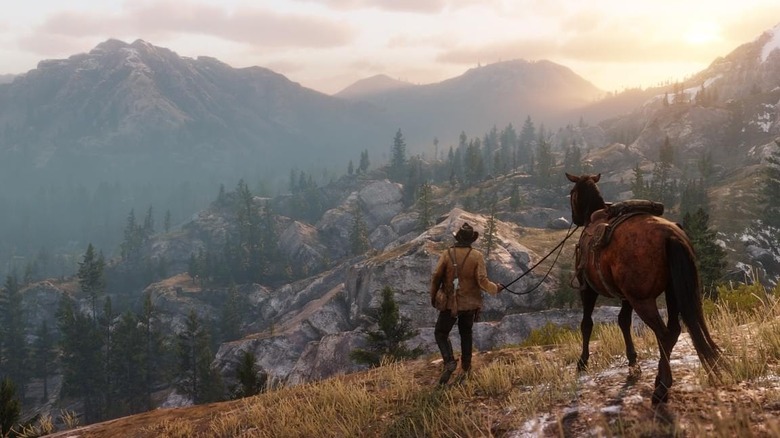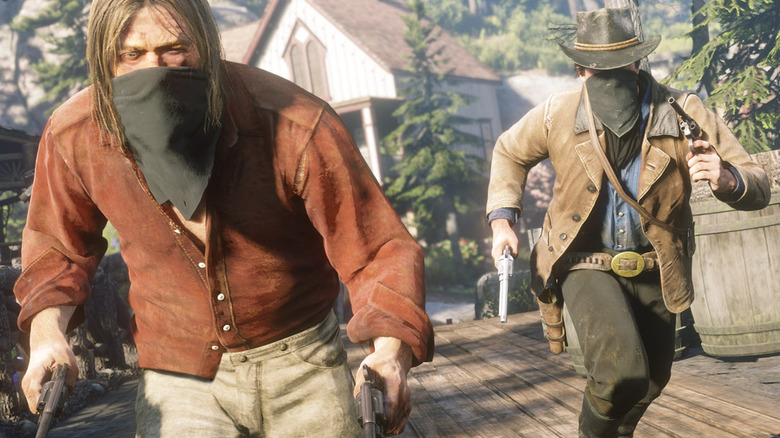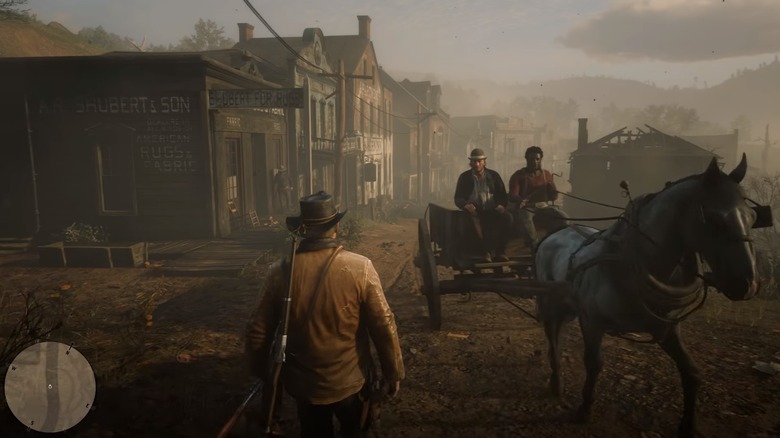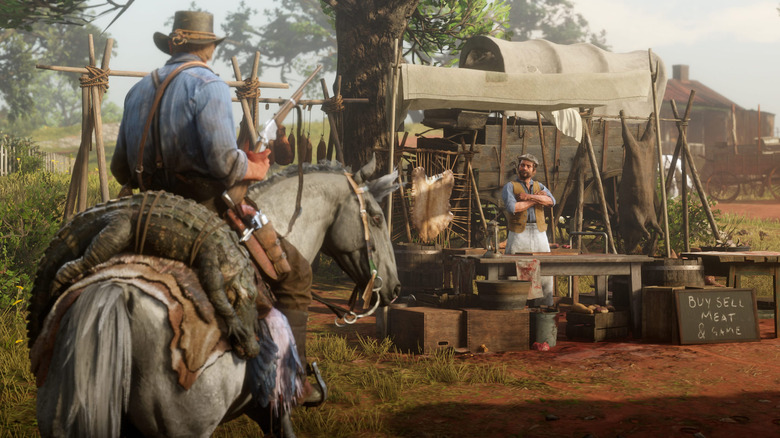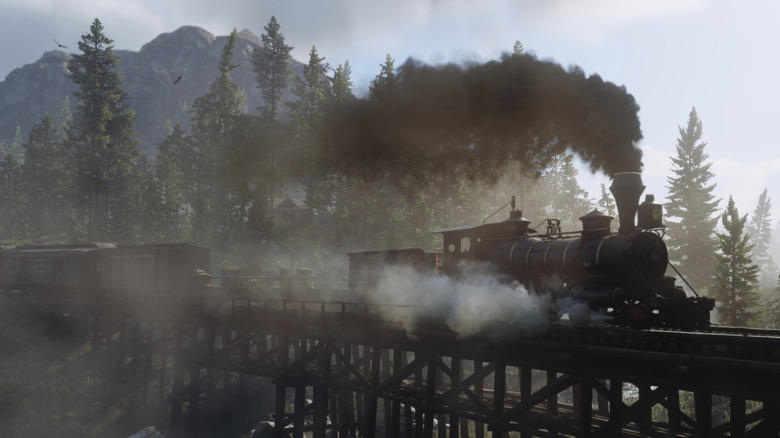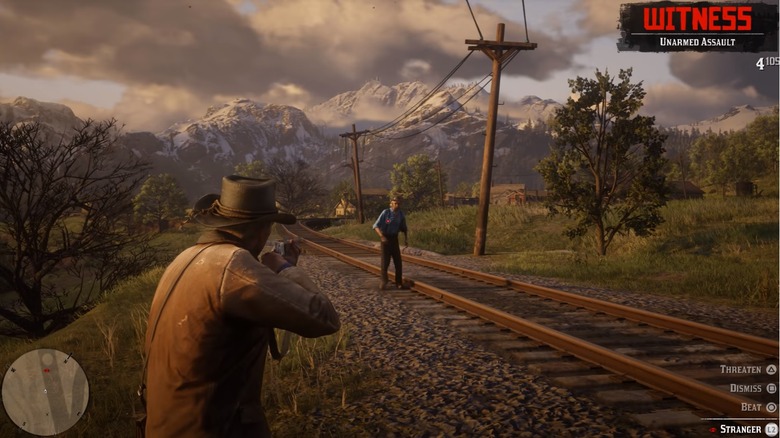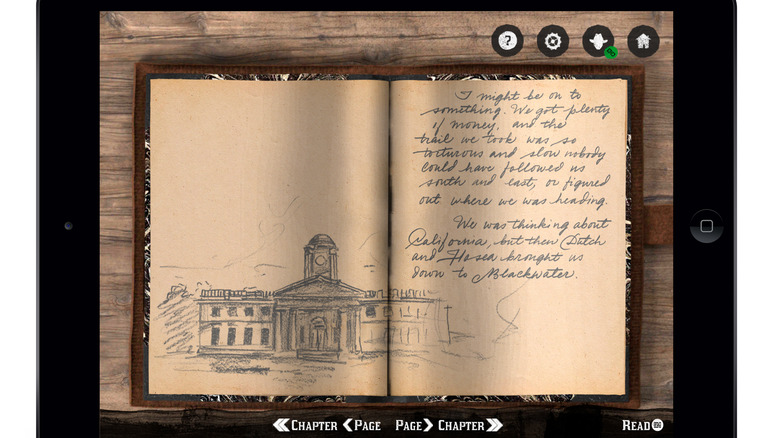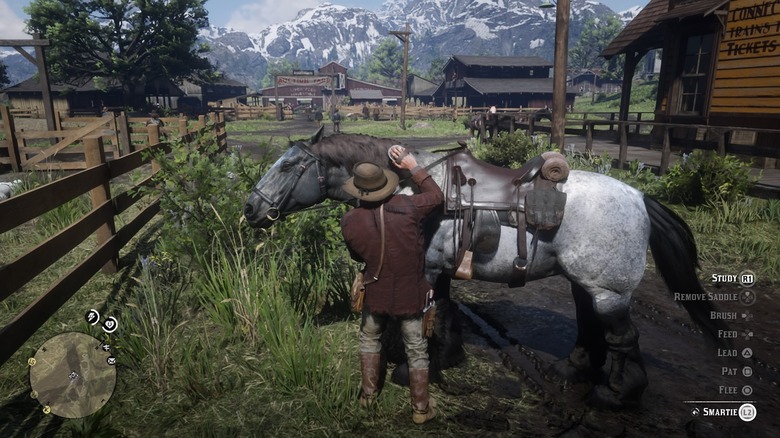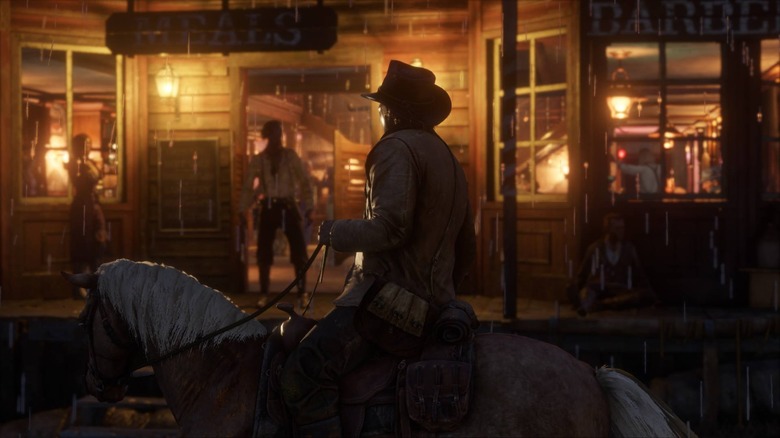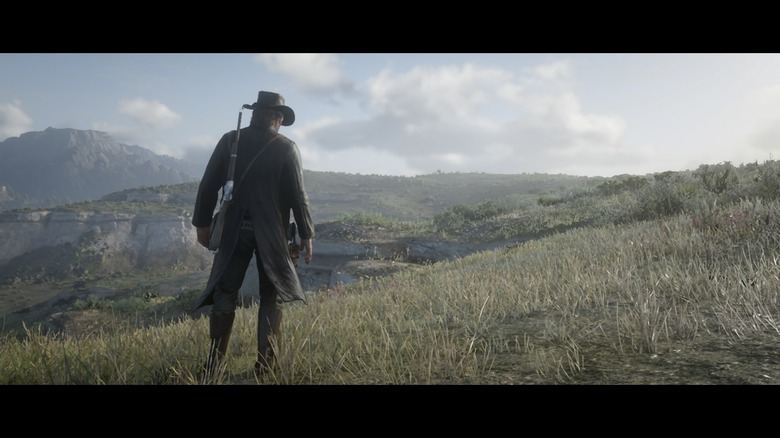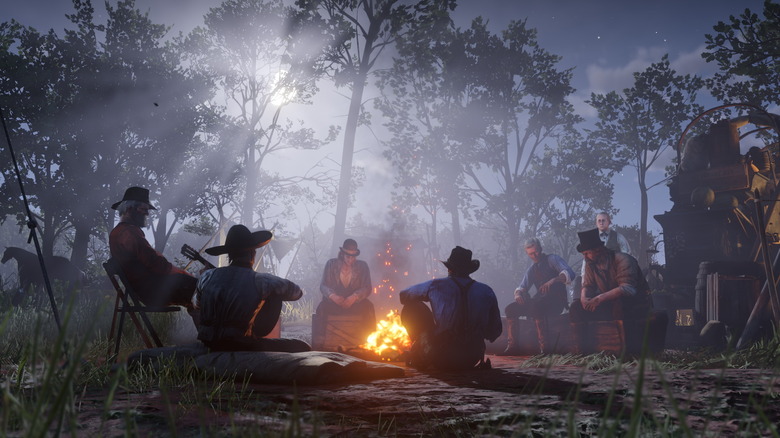What Other Games Can Learn From Red Dead Redemption 2
Rockstar Games had a daunting task with Red Dead Redemption 2: follow up the most ambitious open-world game ever made in Grand Theft Auto 5, as well as make a follow-up to one of the most critically acclaimed pieces of entertainment ever created in the first Red Dead Redemption. It took seven years, a budget stretching far into the hundreds of millions, and no small amount of excruciating labor, but the studio has proven itself more than capable of pushing the envelope yet again. Every single aspect of Red Dead Redemption 2 is above and beyond what players can expect from even the most polished titles already on shelves. Once again, Rockstar has shown the industry that they could be doing more and doing it better, and here's just a few of the things other game developers should be taking painstaking notes on.
Let players easily replay missions
This feels like a no-brainer for many open-world games, and yet it remains a rare thing to see. If you want to replay a mission, hopefully, you've got a save file right before it happened, because otherwise, you're only catching that mission on your next playthrough or on YouTube. Red Dead 2, on the other hand, has a handy menu that allows you to jump to any previous mission, replay it, and go about your merry way again after.
More than just a way to revisit, though, it also allows for something open-world titles desperately needed, which is a way to replay the game's tutorial levels. For a game as complex and minute as Red Dead 2, especially when new concepts can blink away before you even get a chance to read it, the ability to get a refresher course on cue is a godsend.
The world can be your GUI
Your average open world can be a beautiful place, but it's a little more difficult to enjoy when you also have a life bar, a minimap, a special ability gauge, a notoriety bar, your money, an icon for your weapons, and instructions for your next mission all vying for screen space. A few games let you minimize the HUD elements, which then makes navigating the world arduous.
Red Dead 2, on the other hand, actively encourages gathering all the information a player could ever need from their environment. You'll still want the map handy for a good idea of where you'll be headed, but smoke coming from homesteads, road signs pointing the way to the next town, even stopping and asking NPCs for directions will get you where you're going. In addition, being able to strip away the information on-screen and just live your life out in the West is a fascinating and immersive experience unlike anything being done at this level of production.
Players should want to break the game world, don't break it for the player
The world of Red Dead 2 is not just a stunning one of achingly gorgeous sunlight, blue skies, and green foliage, but a place that by and large just feels like a real place, full of insurmountable hills, valleys, cliffs, and rivers. It's never quite clear what you can walk through or what kind of danger to expect over the next ridge. Only once you play it do you realize just how much designing a world first can do for a game.
In other games, when you see a wide open space hidden away in the woods, or a castle off in the distance, or a lonely house sitting on a hill, you know that eventually, a mission will take you there and something important will happen. You'll see a ramp, and know that driving off it at top speed will tell the game you've completed one of its myriad challenges. The game world is telling you "This is what you can do here," when arguably, it's more satisfying for the player to actually wonder "What can I do here?" Nothing in Red Dead 2 feels like it's there for Arthur Morgan's benefit, so it's up to you to figure out what things in the world can be made to benefit him.
NPCs are people too
Even the best open-world games that have ever been created have a tendency to make big beautiful spacious worlds with only barely functional people in them. As detailed and intricate as your average Assassin's Creed title is, your level of interaction with anyone who isn't directly tied to a mission is limited to bumping into them, making them drop their stuff. Another situation where it's the player's world, everyone else is just living in it.
Not so in Red Dead 2. Even if it's just Arthur tipping his hat to a passing stranger, there's enough detail in every human being you meet in your travels to hint at an inner life, where they're going, where they've been, their personality. After a few minutes, you start to think twice about randomly shooting strangers. You're careful, considered, and even if you decide to screw with someone's day and antagonize them, that NPC shooting you dead or starting a fight is always on the table. The people make Red Dead's Wild West feel alive more than a hundred highly detailed log cabins ever could.
Destroy the barriers separating main quests from sidequests
A major ongoing problem with open-world design is that developers make it abundantly clear which tasks will advance the story and get the player closer to being "done" and which ones are less important. It's possibly THE biggest problem with open-world titles these days, because many developers haven't improved their ability to fill ever-larger spaces with anything meaningful or fun to do. If story missions are the meat, sidequests and other activities are unseasoned, gristlebound fat.
Red Dead 2's solution to that problem is making a game where every marked mission is worthwhile, and none are given more or less priority to anyone except the player themselves. If you want to ignore certain people's quests until the last minute, you can, and the story will keep advancing. There's no friendship meter that suffers, there's just the ability to for Arthur Morgan to live the outlaw life as he sees fit for the good of his people. What's driving the narrative isn't a sense of completionism so much as actual investment in the characters. The world isn't full of content, but substance.
Make it a world worth living in
Fast travel isn't just handed to you in Red Dead 2. It involves two specific upgrades to Dutch Van Der Linde's and Arthur Morgan's tents, neither of which are particularly cheap, especially in the early going. So unless you've managed to catch a ride, or found yourself on a mission where you bring your horse, there are times where you'll find yourself with a hike on your hands.
And yet, the magical thing about Red Dead 2 is how little you end up minding. In a world where there's always something happening on every road, something to hunt that crosses your path, or something so serene and inviting you'd rather just sit and watch for a minute, the occasional hike is a welcome distraction. That's a shift from how most games design around the open world, which is about getting players from one quest to another. Wandering the world on foot usually doesn't serve a purpose, and what little there is to do doesn't benefit the player except in the most rudimentary way. In Red Dead 2, by contrast, wandering through the woods almost always gives you a story to tell at minimum, or the materials you need to survive at its best.
Actions should have consequences
There's a scene in Arnold Schwartzenegger's Last Action Hero where the villain makes his way into the real world, shoots a random person, and stands around yelling for someone to notice. Once he finds out there are no consequences for his actions, he goes on a rampage. Virtually every open-world game operates the same way. Soldiers will come after you, or the cops put out a bulletin, but all it usually takes is a trip to a Pay 'N Spray or a hay bale and life goes on as normal. It works because it's a game, and you want an easy Get Out Of Jail Free card for these instances.
But then there's Red Dead 2, which does still allow you to pay off your bounty at post offices, but it only lets the game forgive the crime. It doesn't forget. Kill a local lawman, or rob a store, and townsfolk will spit at your feet, store owners will give you side-eye when you walk in their store, and people scurry away from you on sight. The world remembers your crimes, which adds just the perfect dollop of tension and consideration to every little crime you intend to commit. More than just making the player careful, it means, whether you intend to cause chaos in it or not, you respect the game's world all the more.
A companion app should be an actual companion
While it always sounds like a fancy, 21st-century idea on paper, you can count on one hand the number of times a companion app for any movie, TV show, or game has ever been worth the time and effort to log into more than once. Even if the information contained therein is useful and vital — the days when the Destiny app was the easiest way to view the lore material come to mind — the design tends not to be.
Rockstar's app for Red Dead 2 is just elegant all around. It includes the game's map and updates in real time just like the one in-game, which makes for another reason to turn the minimap off in the HUD. The manual is there, as is a digital version of Arthur's handwritten journal, something that's very easy to forget exists the further you go in game, but gives a window into Arthur's heart we don't get as often during gameplay. It's a rather elegant solution that enhances the point made earlier about keeping the on-screen experience neat and tidy.
Your relationship to everything matters
Historically, gamers are used to resources simply being there, where guns always have enough bullets, cars are disposable, and horses spawn out of nowhere. The world is, again, completely yours to usurp. Funny enough, that exact mindset is part of the plot of Red Dead 2, where Manifest Destiny is in its waning days, and its completion means the men and women born and raised to make it happen are no longer welcome in the country it forged.
The real irony is that Red Dead 2 very much treats every resource, every animal, every person, and every plot of land as its own relationship, something to be considered, maintained, and respected if you expect to get anywhere. Guns must be cleaned, horses brushed and fed, your gang must get their cut of your profits. Most important, Arthur himself may bathe, sleep, and eat. Red Dead 2 is less about amassing wealth and power, but the tiny moments of figuring out how to wield and conserve it for your own good and the good of others. As such, nothing in the game feels truly disposable. You appreciate every tiny scrap you pick up, and the game has a use for it. When you pick up a coffee cup in Fallout, it's trash. Pick it up in Red Dead, it probably just bought you lunch.
Violence isn't always the answer
In most open-world titles, between the big action sequences and frivolous mini-games is a vast unexplored potential for different types of stories and activities. Not nearly enough games get creative about that, and the fact that side missions can virtually always be ignored means that no one activity can ever be so intriguing as to eclipse the main plot.
In RDR2, however, quests can have you hijacking a train, but they might also have you sucking the poison out of a poor man's snakebite, or giving a stranded farmer's wife a lift home. There is no ulterior motive to these tiny quests, no big twist or diabolical scheme at play. These are just things that happen in the world, a brief, satisfying small story to tell. More importantly, these quests usually never involve Arthur having to draw his gun. Arthur stops being a protagonist for just one moment and starts being a citizen, a participant in someone else's world. And there's a beauty and respite in that. In AAA gaming, variety usually boils down to different weapons to kill with, especially in Rockstar's previous titles. Here, in RDR 2, variety in gameplay is truly diverse.
A change in perspective is always a good thing
Traversal is pretty much the cornerstone of any open world title, but even as fun as getting around can be, it's still time traveling. Even someone who loves going for a drive eventually zones out on the highway. Red Dead's solution is twofold. The first person mode from GTA 5 has returned, which doesn't just make combat easier and more immersive, but also makes navigating tight enclosed spaces indoors much easier.
Bethesda's games have that though. What no one else has done is Red Dead 2's Cinematic Mode.
Long trips during a mission are a fact of life in Red Dead 2, but Cinematic Mode allows you to truly sit back and enjoy the scenery in a variety of well-chosen panoramic vantage points, giving players a sense of where they are. It makes even the most mundane conversations Arthur can have with his travelling companions a sense of expansiveness you usually have to wait for a proper cutscene to get out of the game. Here, you still maintain full control, and when time comes to fill your hands, getting back in Arthur's skin is a push of a button away.
Patience is a virtue
If there's any creative throughline to many of these facets of Red Dead 2, it is this: this is not a game to be rushed. Speedrunners are going to have a devil of a time trying to cut corners in this game, because it's not a game that's just trying to usher its players into enjoying the sandbox, nor is it just trying to foist its story on them, despite the fact that both are possible. Red Dead 2 is a game about patience, about the slowness of life unhampered by industrialization. It's a game tailor made to make players take note of the details, to not just do what is required, but participate in every facet of what has been built.
Open-world titles, by their very nature, build a world. The developers at Rockstar built a society and an ecosystem for Red Dead Redemption 2. It demands that you engage it in entirety, from respecting the tiniest animal to causing the biggest explosion. You are expected to pay attention, and the game rewards you every step of the way for it. Even when its quiet and still except for the sound of crickets, there are no dead moments in Red Dead 2. There's only more of the game you haven't noticed yet.

